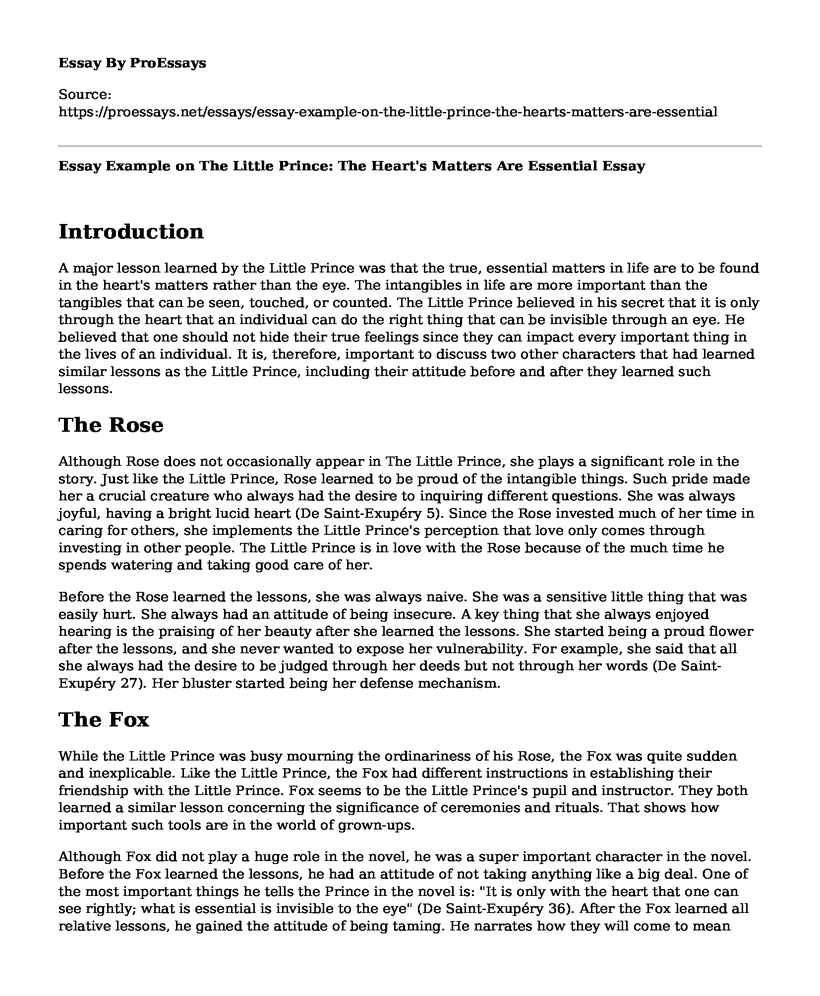Introduction
A major lesson learned by the Little Prince was that the true, essential matters in life are to be found in the heart's matters rather than the eye. The intangibles in life are more important than the tangibles that can be seen, touched, or counted. The Little Prince believed in his secret that it is only through the heart that an individual can do the right thing that can be invisible through an eye. He believed that one should not hide their true feelings since they can impact every important thing in the lives of an individual. It is, therefore, important to discuss two other characters that had learned similar lessons as the Little Prince, including their attitude before and after they learned such lessons.
The Rose
Although Rose does not occasionally appear in The Little Prince, she plays a significant role in the story. Just like the Little Prince, Rose learned to be proud of the intangible things. Such pride made her a crucial creature who always had the desire to inquiring different questions. She was always joyful, having a bright lucid heart (De Saint-Exupéry 5). Since the Rose invested much of her time in caring for others, she implements the Little Prince's perception that love only comes through investing in other people. The Little Prince is in love with the Rose because of the much time he spends watering and taking good care of her.
Before the Rose learned the lessons, she was always naive. She was a sensitive little thing that was easily hurt. She always had an attitude of being insecure. A key thing that she always enjoyed hearing is the praising of her beauty after she learned the lessons. She started being a proud flower after the lessons, and she never wanted to expose her vulnerability. For example, she said that all she always had the desire to be judged through her deeds but not through her words (De Saint-Exupéry 27). Her bluster started being her defense mechanism.
The Fox
While the Little Prince was busy mourning the ordinariness of his Rose, the Fox was quite sudden and inexplicable. Like the Little Prince, the Fox had different instructions in establishing their friendship with the Little Prince. Fox seems to be the Little Prince's pupil and instructor. They both learned a similar lesson concerning the significance of ceremonies and rituals. That shows how important such tools are in the world of grown-ups.
Although Fox did not play a huge role in the novel, he was a super important character in the novel. Before the Fox learned the lessons, he had an attitude of not taking anything like a big deal. One of the most important things he tells the Prince in the novel is: "It is only with the heart that one can see rightly; what is essential is invisible to the eye" (De Saint-Exupéry 36). After the Fox learned all relative lessons, he gained the attitude of being taming. He narrates how they will come to mean something with the Prince after establishing the taming attitude.
Conclusion
The Little Prince can be understood as an enlightening parable. The novel reminds people of the importance of keeping their eyes and hearts open. Although it may be one's secret, it is only through the heart that an individual can see rightly. There is a place of miracle within the heart that everyone needs to see.
Works Cited
De Saint-Exupéry, Antoine. The Little Prince: A new translation by Michael Morpurgo. Random House, 2018.
Cite this page
Essay Example on The Little Prince: The Heart's Matters Are Essential. (2023, Aug 08). Retrieved from https://proessays.net/essays/essay-example-on-the-little-prince-the-hearts-matters-are-essential
If you are the original author of this essay and no longer wish to have it published on the ProEssays website, please click below to request its removal:
- The Statue that Hugh Wolf Carves in Rebecca Davis's Life in the Iron Mills
- Ballad of the Totems by Oodgeroo Noonuccal (Kath Walker)
- The Poem in the Park Essay
- Literary Analysis Essay on Love in Midsummer Night's Dream
- The Moral Justification Against and in Favor of Torture in 1984
- The Grapes of Wrath Play Analysis Paper Example
- The Sovereignty of Divine Law Over Civil Law in Antigone: Critical Essay Sample







